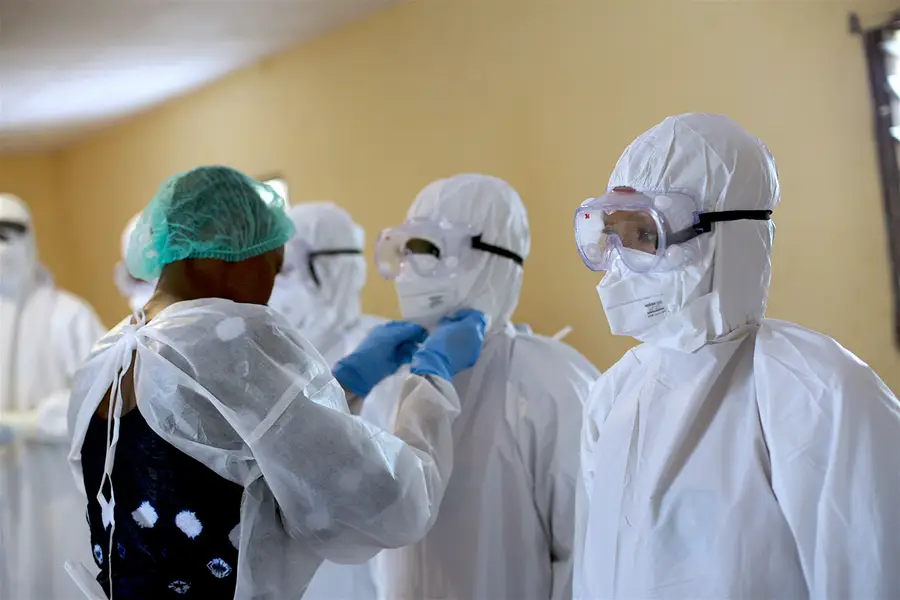
This year, we are celebrating World Malaria Day in the shadow of the COVID-19 pandemic, which is just beginning its lethal run through Africa. World Malaria Day is typically a day for the global community to reflect on the collective progress of national malaria control programs and to recommit to the ultimate goal of elimination. This year it is important to recognize that the burden of malaria in Africa does not disappear when a pandemic arises and can, in fact, become worse.
Recent history has shown that when outbreaks happen, resources are diverted from primary health services and people stop seeking care, resulting in excess morbidity and mortality from diseases that are preventable and treatable. For example, when Ebola raged through West Africa from 2014-2016, people became wary of seeking health care when they were ill due to health centers and hospitals presenting a high risk of exposure to the deadly virus. At the same time, health care resources were rapidly channeled into addressing the urgent needs of the Ebola outbreak response. Models have shown that these disruptions to normal health care provision could have resulted in an estimated additional 3.5 million untreated cases of malaria, with 10,500 additional malaria-attributable deaths in Ebola-affected countries in 2014.
We must learn from the past and work together as a global community to maintain robust malaria prevention and case management programming in the face of the COVID-19 pandemic. Continuing to implement and provide support for these interventions will not only prevent lives lost due to malaria, but can complement and enhance efforts to mitigate the impact of COVID-19 in the following ways:
- Reduce the strain on the health system and health workers: Maintaining malaria prevention activities, such as the distribution of bed nets, will greatly reduce the number of people with malaria-related fevers reporting to health facilities, enabling health care personnel to focus their attentions on potential COVID-19 cases. Similarly, drug-based prevention strategies such as seasonal malaria chemoprevention (SMC), which provides malaria prophylaxis to children under five, will further reduce the number of malaria cases in the community.
- Protect the community: Prevention efforts not only reduce the number of malaria cases seen at health centers, but they reduce onward transmission of malaria in the community. Bed nets, SMC and other means of prevention reduce the amount of malaria circulating in the community, meaning fewer people will get infected. Fewer malaria infections translates to healthier, stronger communities that are better able to fight off the COVID-19 virus.
- Guard against excess mortality: Continuing to provide malaria diagnosis and treatment services, as well as other primary care services, prevents additional deaths that might occur if people avoid seeking health care (as seen in the Ebola example above).
The World Health Organization (WHO) and others in the global malaria community have come together to provide guidance on how to safely continue to provide malaria prevention, diagnosis, and treatment services in the context of the COVID-19 pandemic. As COVID-19 starts to move through Africa, countries are taking immediate steps to ensure the continuity of malaria control activities and adapt existing activities to mitigate the spread of the current pandemic.

In Guinea, the USAID StopPalu+ project, implemented by RTI, is working alongside the National Malaria Control Program to continue to hold critical monthly malaria review and planning meetings and undertake field activities while implementing WHO guidelines to ensure the safety of all staff, health workers, and community members. At meetings, handwashing stations are provided at the entrance and staff temperatures are taken before gathering. Meetings are kept small at 20 people maximum; participants sit at a distance from one another; and meetings are often held outside to facilitate distancing. When community health workers conduct their home visits, they keep their distance from the families they are visiting and do their assessments outside the homes.
Mali is ensuring that SMC treatment continues in the face of COVID-19 because of the intervention’s critical role in preventing malaria-related fevers. The country’s nationwide SMC campaign targets approximately 3.5 million children under five, providing them with malaria prophylaxis, which will prevent them from needing to seek treatment for malaria at a health center. In addition, the government screens all the eligible children for fever, and provides testing and treatment for those who are positive. Of these children with fever, about 10% are positive for malaria at the time of the home visit, meaning that approximately 56,000 children will be tested and treated in the field. Taken together, this approach to SMC will alleviate the burden on the health care system during a critical time in the COVID-19 pandemic.
South Africa has mobilized its network of community-based health workers to conduct nationwide screening of the population for COVID-19 infection. This cadre of 28,000 community health workers traditionally provides basic health services, including malaria testing, to communities with limited access to health care. By leveraging their experience and knowledge of their communities, South Africa has screened over two million people in recent weeks, providing a vital source of data for their pandemic response.
These are just a couple of examples of how malaria programs are adapting to a new reality. As Africa begins its battle against COVID-19, it is important that malaria control efforts are not curtailed. Maintaining prevention and case management activities will benefit both the communities and the health systems as they face this new challenge. Indeed, the platforms built during the last 20 years of intensified malaria control efforts, such as surveillance systems and community health worker networks, should form the backbone of the fight against COVID-19. This World Malaria Day let’s ensure that strong malaria programming continues uninterrupted so that we can help protect vulnerable populations against both malaria and COVID-19.
Erin Eckert is an infectious disease epidemiologist with 25 years of experience in managing and evaluating infectious disease programs and conducting operational research. She is currently Director of the Infectious Disease Portfolio at RTI International, where she manages multiple projects in Africa and Asia addressing malaria and infectious disease priorities. Prior to RTI, she served as Senior Technical Advisor/Epidemiologist with the President’s Malaria Initiative (PMI) at the United States Agency for International Development (USAID), where she served as the lead for the SMC portfolio and provided technical guidance for malaria control surveillance and interventions.
